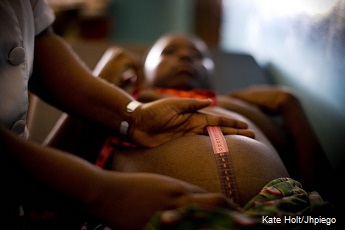Maternal Nutrition
Inadequate dietary practices and weight gain during pregnancy contribute to poor birth outcomes, such as intrauterine growth restriction and low birth weight. MCSP led a literature review on barriers to maternal nutrition in low- and middle-income countries and implications for programs:
- Addressing barriers to maternal nutrition in low‐ and middle‐ income countries: A review of the evidence and programme implications
- Addressing Barriers to Maternal Nutrition: Evidence and Program Considerations
The Program incorporated findings from the global review and other country level formative assessments to develop or improve upon counseling approaches and messages on healthy diet during pregnancy and postpartum at the country level, keeping drivers of food choice and cultural beliefs in mind. MCSP also operationalized guidance on the World Health Organization Antenatal Care Guidelines.
We continued work begun under USAID’s predecessor Maternal and Child Health Integrated Program (MCHIP) to incorporate maternal nutrition services with infant and young child counseling and family planning. Such integration maximized routine health contacts, providing information and services for mothers and children to prevent anemia, stunting and overweight, while ensuring adequate timing and spacing of pregnancies. Under MCHIP, maternal and young child nutrition and family planning behavior change messages were integrated into materials for use during home visits by community health workers and facility-based counseling.

